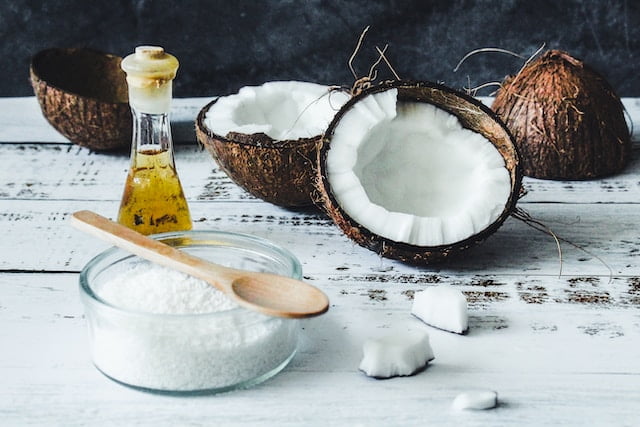Coconut oil, also known as coconut fat, is a consumable oil extracted from the kernels, meat, and milk of the coconut palm fruit. It exhibits a solid white fat consistency at temperatures below approximately 25 °C (77 °F), while in warmer climates, it transforms into a transparent, thin liquid oil. Unrefined variations possess a noticeable coconut fragrance. This versatile oil finds application not only as a food oil but also in various industrial sectors, including cosmetics and detergent manufacturing.

Image credit – Unsplash
Is it ok to apply coconut oil on face?
- Indeed, coconut oil is a highly beneficial substance due to its abundant saturated fats, which possess remarkable properties for skin health.
- When topically applied, it effectively soothes the skin, prevents dryness, and mitigates the formation of wrinkles. Moreover, its well-established antibacterial attributes make it an effective treatment for infections and acne removal.
- Additionally, coconut oil enhances skin elasticity, resulting in a softer and more youthful appearance. Conversely, Aloe Vera, a renowned soothing herb, aids in the repair of skin cells, thereby promoting overall skin health, firmness, and softness.
- When combined, these two ingredients create a potent blend that effectively resurfaces and nourishes the skin.
- As a frequent user of coconut oil, experts can attest to its unparalleled benefits.
- In their experience, no lotion, cream, or body butter can compare to its exceptional qualities.
- Experts prefer virgin coconut oil over regular coconut oil due to its lightweight texture, ability to impart a radiant glow to the skin, and its suitability as a substitute for night cream.
- Additionally, it does not leave the skin looking oily and is suitable for all skin types. It is particularly effective for dry skin, acting as a divine messenger to prevent excessive sebum production in oily skin.
Is it good to apply coconut oil on your body and face daily? Does it make your skin dry and black?
- As we are currently during winter, you may be seeking solutions to alleviate dryness and itchiness. For generations, Indians have relied on parachute oil, or simply coconut oil, to combat dryness.
- In South India, coconut oil is even consumed for its ability to promote a radiant complexion and lustrous hair.
- Similarly, when used topically, coconut oil can provide a glowing complexion. Parachute oil, a renowned brand in India synonymous with coconut oil, can effectively address itchiness and dryness.
- However, there are certain precautions to consider when applying coconut oil to your face and body. Firstly, it is crucial to understand your skin type.
- If you have oily skin, you can mix a few drops of water with parachute oil to prevent an excessively greasy appearance. We jest, of course, about resembling fried French fries.
- On the other hand, if you have dry skin, even applying half a liter of oil at once may result in your skin absorbing it quickly and becoming dry again.
- As someone with dry skin, I have conducted this experiment multiple times.
- To counteract this, after showering, refrain from vigorously drying your skin. Instead, gently pat your skin with a towel to retain moisture, and promptly apply parachute oil all over your body.
- However, for your face, it is advisable to also apply a moisturizing lotion.
- Secondly, it is crucial to avoid prolonged sun exposure if you intend to use oil regularly, as this can cause your skin to darken a few shades.
- Lastly, for optimal results, apply the oil at night before bed. Massage it into your skin and allow it to absorb overnight, effectively hydrating your skin.
Can I use Parachute coconut oil in an acne-prone skin?

Image credit – Unsplash
- Yes, it is possible to use coconut oil on your face. However, it is recommended to apply a small amount on your face, leave it on for a period, and then wash your face with a mild face wash.
- This process helps to remove excess oil, reducing the likelihood of breakouts. It is also advisable to apply the coconut oil before sleeping, allowing it to be absorbed before any sweating occurs.
- The combination of sweat and coconut oil can lead to undesirable breakouts.
- Regarding the brand Parachute coconut oil, it offers various variants, some of which are of poor quality. However, there is one variant that stands out as excellent.
- It is important to avoid using the “jasmine advanced” or “ayurvedic hot oil” variants, as these contain more coconut in their name than in the actual oil.
- These blends typically consist of over 50% mineral oil.
- The recommended variant from Parachute is the 100% coconut oil, which will be labelled as “edible” somewhere on the bottle.
- The packaging will be a darkish blue, opaque plastic and will have a simple design compared to the more elaborate packaging of other variants.
- However, it is advised not to use this oil every night. It is recommended to use it once, or at most twice, a week. The frequency may also depend on the weather conditions in your area. Cold and dry weather is generally more favourable than hot and sweaty weather.
- Please note that this advice assumes that your skin is prone to acne or generally oily, and does not have any serious dermatological issues.
Is coconut oil good for sun-damaged skin?
- Coconut oil has been widely recognized for its beneficial effects on sun-damaged skin. It has been utilized as a treatment for various skin conditions, including dermatitis and eczema.
- Proponents of coconut oil assert that it possesses cooling and soothing properties, making it an effective remedy for sunburned skin.
- Additionally, it is believed to alleviate symptoms such as itching and peeling.
- The efficacy of coconut oil in addressing these concerns can be attributed to its high content of saturated fats, which are renowned for their moisturizing properties.
- Sunburned skin often experiences dryness and itchiness, and the application of coconut oil can potentially alleviate these symptoms by replenishing the skin’s moisture levels.
- For those seeking pure cold-pressed virgin coconut oil, Veda Oils is a reputable source worth considering. This esteemed company specializes in the production of premium essential and carrier oils in India.
Can coconut oil help tighten saggy skin?
- Coconut oil has been found to be effective in tightening saggy skin. This natural moisturizer possesses properties that can reduce wrinkles and sagging skin.
- Its high content of fatty acids and antioxidants promotes collagen production and enhances skin elasticity, resulting in a firmer and tighter appearance.
- One of the key advantages of using coconut oil is its natural composition, which eliminates the risk of skin irritation often associated with chemical-based creams or lotions.
- Moreover, coconut oil is easily absorbed and does not clog pores, making it particularly suitable for individuals with sensitive skin.
- To utilize coconut oil for skin tightening, it is recommended to begin by cleansing the face with a mild cleanser and gently patting the skin dry. Subsequently, a small amount of coconut oil should be applied to the face using circular motions.
- Allowing the oil to remain on the skin for approximately 10 minutes before rinsing off with warm water is advised.
- For enhanced tightening effects, a mixture of equal parts coconut oil and honey can be prepared and applied to the face.
- Honey aids in extracting impurities from the skin, resulting in a tighter appearance. After approximately 15 minutes, the mixture can be rinsed off with warm water.
- For optimal outcomes, it is advisable to incorporate coconut oil into the skincare routine at least once a day. Consistent usage will gradually yield noticeable improvements in skin firmness and elasticity.
Is it okay to apply coconut oil on one’s face during the day, or would an exposure to the Sun irritate the skin?

Image credit – Unspalsh
- Coconut oil is a suitable option for individuals with sebum-deficient skin who require additional oil moisturization to maintain their skin’s barrier function.
- However, it may prove to be too heavy for other skin types and can also be comedogenic, leading to pore blockage. As a result, it is not recommended to use coconut oil as a day moisturizer on the face, as it can cause breakouts and attract dirt and dust.
- Although coconut oil is beneficial for extremely dry skin that is not prone to blocked pores and requires additional oil, it is still not recommended to use it on the face without additional sunscreen or sunblock.
- It is worth noting that there are natural sunscreens available that contain minerals, which are considered physical sunscreens, as opposed to homosalate or ovobenzone, the two most common chemical sunscreens that are becoming increasingly controversial.
- Regardless of the climate, it is crucial to use SPF to protect the skin.
- Exposure to the sun’s harmful rays can result in skin damage and inflammation, leading to loss of moisture.
- While coconut oil can serve as a protective barrier against further moisture loss, it does not possess the ability to replenish moisture or provide anti-inflammatory and soothing benefits.
- Aloe, on the other hand, is a preferred option due to its cooling anti-inflammatory properties and ability to promote skin healing through moisture retention.
- While coconut oil may offer some benefits, natural alternatives such as aloe or cactus are more effective in addressing sunburn concerns.
- In conclusion, while coconut oil can be a beneficial addition to one’s dietary regimen, it is vital to remain cognizant of both its potential advantages and risks.
Benefits of using coconut oil on face

Image credit – Unsplash
- Coconut oil possesses numerous advantages that can greatly benefit your skin. These include its ability to reduce inflammation, counteract the damage caused by free radicals, and aid in the prevention of infections.
- Additionally, it serves as a natural moisturizer, particularly for facial skin. The gentle nature of coconut oil allows for its application in sensitive areas such as under the eyes and on the lips. For individuals with oily or combination skin, experimenting with coconut oil as a spot treatment around the eyes or on dry patches may prove beneficial.
- When selecting a facial oil, it is advisable to opt for organic coconut oils that are labeled as unrefined, virgin, or extra virgin. Unrefined coconut oil, produced through the pressing of the coconut’s edible flesh and typically devoid of added chemicals, is the most suitable choice for skincare.
- Cold-pressed oil, in particular, contains higher levels of fatty acids and beneficial compounds for the skin. Coconut oil is derived from raw coconuts or dried coconut flakes and possesses emollient properties that can be advantageous for certain skin types, such as dry or normal-to-dry skin, when utilized as an overnight moisturizer.
- Read more about How to make coconut yogurt at home ?
ADDED BENEFITS OF USING COCONUT OIL ON YOUR FACE OVERNIGHT
- Enhances skin hydration. Coconut oil serves as a valuable aid in fortifying the protective barrier layer of your skin, effectively sealing in moisture and promoting supple and well-hydrated skin.
- Diminishes inflammation. The anti-inflammatory properties of coconut oil render it highly advantageous for alleviating skin irritation and chafing.
- Promotes collagen synthesis. The presence of lauric acid in coconut oil exerts a positive influence on the production of collagen, a vital component for maintaining skin firmness and elasticity. By facilitating collagen maintenance and synthesis, coconut oil may potentially reduce the formation of fine lines and wrinkles.
- Evens out skin tone. As suggested by beauty few experts, coconut oil possesses the ability to lighten the skin and potentially minimize the appearance of dark spots or uneven skin tone. The addition of lemon juice may further enhance this lightening effect.
